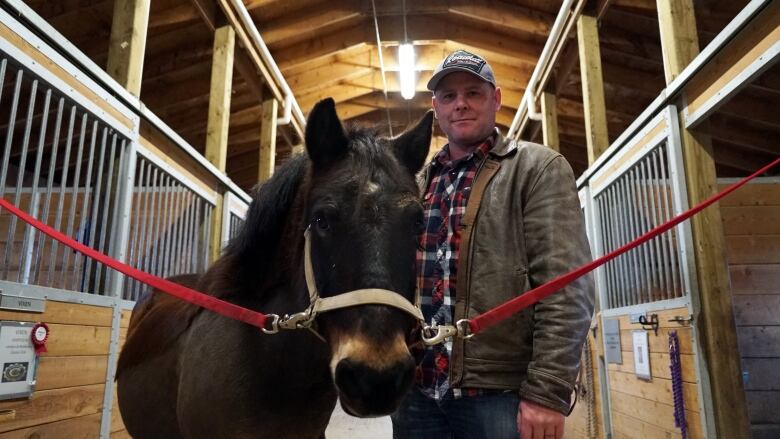How a horse is helping a military veteran deal with his PTSD
Owen McElroy says a horse nicknamed 'Big Ben' has turned his life around

Owen McElroy says he spent years going to the doctor, trying to find out what was wrong with his hearing.
"I had a hard time hearing my wife and my children, or in crowded rooms all these noises would come together and I'd have a hard time really making out any sort of sound around me," said McElroy, who spent over 14 years in military service, including a deployment in Afghanistan as a vehicle technician.
It turned out that nothing was structurally wrong with his ears. McElroy's doctor told him that his post-traumatic stress disorder (PTSD) meant his brain couldn't process all the stimuli coming in.
This summer, the 35-year-old from Aylmer finally found a treatment that helped — horses.
In fact, one horse in particular: an Exmoor pony he jokingly nicknamed 'Big Ben.'
McElroy was part of a 10-week equine therapy pilot project between Brescia University College and Sari Therapeutic Riding.
For two hours every week, a group of veterans groomed, walked and spent time with their horses at Sari's barn in Arva, Ont.
"Moving through this [program] I could actually differentiate between the wheat field and the wind blowing through the leaves. And that was absolutely like an 'A-ha!' mind-blowing moment for me," he said.
McElroy was first diagnosed with PTSD in 2012 and retired medically in September 2016. He says the transition to civilian life made his symptoms worse.
"It was a big culture shock, lots of changes, and I wasn't going back to work. So rather than getting better really quickly it actually took a bit of a nose dive."
McElroy believes the Sari program, combined with medication and therapy, has so far been the most effective treatment for him.
Before the program began, McElroy wasn't well enough to be in the workforce. Now, he's about to begin a job as operations leader with a local recycling company.
"That's really incredible because at the beginning of the summer I was on the verge of being totally and completely incapacitated in the eyes of Veterans Affairs and whatnot," he said.
Why horses?
Animal therapy works because animals live in the moment, said Morrigan Reilley-Ansons, a clinical counsellor who co-facilitated the group.
"You don't see an animal thinking about what happened yesterday or worrying about what's going to happen tomorrow and so they can be a really grounding presence for people," she said.
Horses are particularly effective because they're prey animals, which makes them extremely sensitive to their environment.
"Their primary question is always 'Am I safe?' So in being in tune with their environment makes them really in tune with people in a deep level."
For McElroy, Ben is like a "mirror with a mane."
"One of the problems that many people experience when they're diagnosed with post-traumatic stress is inappropriate responses to things. So you're able to gauge the response that you're having through the actions of the horse."
'Tremendous benefit'
The group of participants was too small for a research paper, so the project is instead being used as a case study, said co-facilitator Susan Morrel.
For now, the research component of the project has been put on the back burner while they move towards offering the second session.
"We kind of know this works," said Morrel.
The focus for now is on veterans, but she said there's potential to offer the program to other groups with PTSD down the road.
McElroy hopes that's the case.
"I really think that there's a lot of research to be done, and a lot of benefit to be had for all sorts of people. First responders as well as military, that whole world of post-traumatic stress mental health — it's just such tremendous benefit, there's no way around it as far as I can see."

